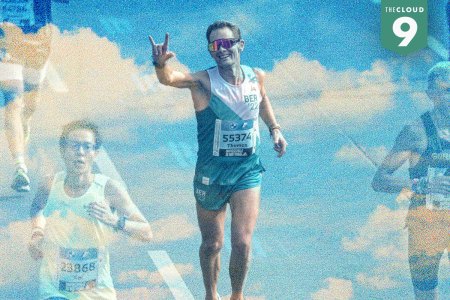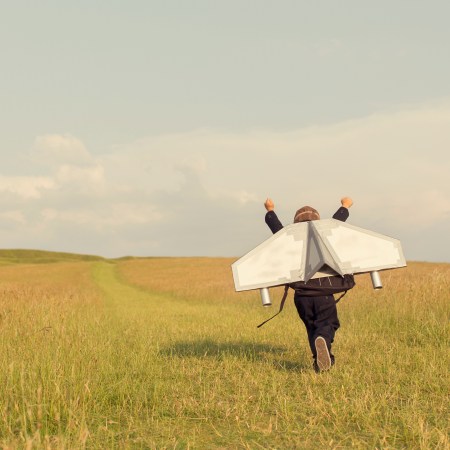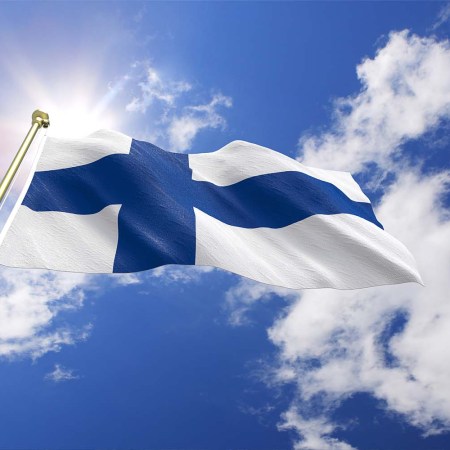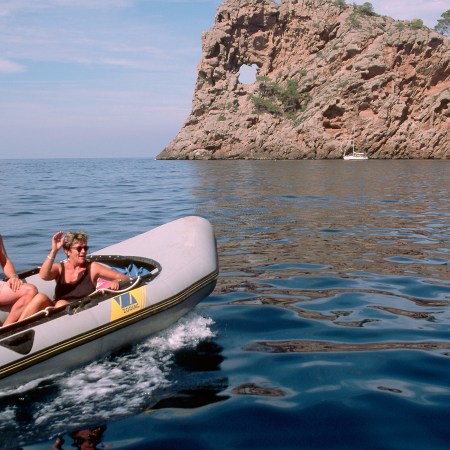This is The Cloud Nine, a series dedicated to unraveling happiness — in all its wonderful, pesky forms. In each edition, we’ll ask an interesting person exactly nine questions about their personal pursuit of happiness. How it’s intersected with success, love, memory, drugs, art, grief, exercise…you name it.
The ocean means a lot of different things to Australian entrepreneur David Trewern.
It’s his morning wake-up call, his sporting religion and one of his oldest companions. He feels anxious when he’s away from it. And when he travels, he seeks out even more of it, hopping from his home in Byron Bay to the atolls of Fiji, which are as surrounded by the sea as any place on the planet.
For the last five years or so, though, the ocean has meant something else to Trewern — it’s become his profession. Once the head of a web development businesses, Trewern now runs Fliteboard, the most innovative and successful electric hydrofoil business in the world.
Someone was going to put a motor on a foil eventually (as Trewern points out, “multiple people around the world had the same idea at the same time”), and there was never any guarantee that Trewern’s backyard beach experimentation was going to morph into a full-time business. But 9,000 sales later, Fliteboard is firing on all cylinders; to hear Trewern wax about it, the brand’s barely getting started. More accessible and affordable boards are coming, commiserate with untapped tributaries in the industry: wave-riding, racing, sustainable transportation.
Still: is it possible to intermingle one’s passion and profession without torpedoing your happiness? He had to think about it, but Trewern says yes. On the heels of Fliteboard’s recent Ultra L drop, we caught up with the founder to talk a lifetime of entrepreneurship, the perils of burnout and the hydroplaning adventures that keep him going.

1. What’s Fliteboard’s origin story?
This is my fourth business. I started my first one when I was about 23. I eventually had a web development business that grew into a 300-person agency and I sold it to WPP. But I got pretty burnt out from 20 years of running businesses. Throughout that time, the ocean was always my go-to for peace and relief. It’s kind of like my religion, I suppose. I was always windsurfing, surfing, kite surfing, kite foiling, kite racing. I actually broke the world’s speed record in kite surfing.
When I exited my last business, I had full on chronic adrenal fatigue. I moved to Byron Bay, which is a place I’ve always loved here in Australia on the coast. We bought a house right on the beach. I’m here right now. My plan was just to have a year off with the family. I didn’t know what I was going to do do next. I spent the first few months here in getting really into all of my favorite water sports. One day, I’m down here, and I’m like, “God, I wanna get out there. But there was no wind…I just was like, “How do I get out there with no wind?” I had this thought: “Well imagine, imagine if I didn’t need wind.” I knew that you don’t need a lot of power with a foil, once you’re up and foiling. So I was actually at a kite surfing race event with no wind, and I just had this idea, “Okay, what happens if we put a motor on a foil?” The other guys that we were with said that’s not gonna work. But I was like, why not? I had no idea how to do it. out the ocean. “I’m gonna put a motor on there. Electric motor don’t need much power.” I had no idea how to do it. Nothing like that existed at the time. This was around May 2016. So I started googling away. I just so happened to be at the perfect top point in my life where I had time to get in the car, drive around, pick up bits and pieces, buy a 3D printer, teach myself CAD.
I never really set out to build a business. I set out to just make one for myself. I just wanted one so I could go and ride out there. You know? I created a a a video, put it up on Facebook. It went crazy. I had all this drone footage of me riding around out there and no one had ever seen anything like it. My son came up with the name Fliteboard. I was sort of kicking around ideas and he was 12. I said, “It’s like a flying surf board.” And he said: “Flight board.”
2. Have you ever found it difficult, or even risky, to run a business centered around something that brings you joy?
For sure. You know, the one way to kill a hobby is to turn it into a business. But on the flip side, I don’t think that anyone should run a business in an area that doesn’t bring them joy. And I don’t think anyone is going be capable of making it successful, if it doesn’t bring them joy. These things just require so much energy and passion to get through all the tough tough periods and the hard decisions. When you’re having one of those down periods, it’s the joy of what you’re doing that actually gets you through that. Otherwise you just give up. And, sure, while you can kill your hobby, how, how amazing is it to turn a hobby into your whole life? It becomes everything you do — you can use that as the core thing to create stuff around and employ people around and everything else. One of my favorite quotes, I remember seeing this when I was 23, when I started my business. From a guy called Albert Schweitzer: “Success isn’t the key to happiness. Happiness is the key to success.” You know, just do what you love…and you’ll be successful. I really 100% believe that.
3. What is the most gratifying aspect of your work?
I was out on the water this morning, you know, catching waves out in front of my place with another two guys from work. We’re all on one wave at once, at one point. It was pretty cool. That’s always gratifying. Or hearing stories from customers about how Fliteboards had an impact on their life. Living in Australia, being in a different time zone, every morning I wake up at 5:30 or 6:00 AM and, it’s sort of a bad habit, but I’ll grab my phone and see all these messages on my phone from the night before. I’m logged into the Fliteboard Instagram account as well. I’ll usually go in there, see sales from the night before. So that’s gratifying [laughter]. But then I’ll go in and look at the messages and every day there’s like something crazy happening somewhere around the world. Someone did something for the first time: they did a 40 kilometer ride across the English Channel. Or a paraplegic learned to Fliteboard by sitting on the board. It’s incredible. The other day, I got an email from a guy who said, “Thank you for inventing Fliteboard. It’s totally changed my life. I had a really difficult relationship with my daughter and she’s going off to college and I’m never gonna really spend much time with her anymore. But we both got into Fliteboarding and we went to Fliteboard together and now it’s the thing that we do every week.” So that was amazing. There was another guy that said he’d been suffering his whole life from anxiety and depression and he thinks that Fliteboard has helped. It’s been an antidote for him. He’s out on the water, you know, feeling really present in nature. It’s totally changed his outlook. Sometimes I also get these kind of “thank you for inventing this” notes, and I’m like…I didn’t. I just did it ’cause I wanted one for myself. I wasn’t thinking of you [laughter]. But it’s so great hearing that stuff.
I think I read about that English Channel crossing.
Yeah, one of our shareholders actually became an investor. He was originally a customer. He crossed the English channel on one charge. It took about two hours and 15 minutes, I think. He’s since taken his board to Maldives; he did a 40-kilometer crossing from one atoll to another. We’ve actually now got a community section in our app now, where you can see other people’s rides all around the world — where they’re riding, what they’re doing. And we’re just about to launch a featured ride section where we’re going to highlight special rides. Because people have done all sorts of stuff, you know, they’ve ridden around the Statue of Liberty or under the Golden Gate Bridge or up the Thames. I went and circumnavigated an island in Sicily on my own. It was 25 kilometers and just cliffs all the way around.
The Cloud Nine
How to Be Happy, According to the First Deaf-Born Person to Run Every Major Marathon
Thomas Eller talks Tokyo, superpowers and daydreaming to the finish lineHow to Be Happy, According to the Best Saxophonist in America
Marcus Strickland talks jazz, aliens and living for the day4. How does the ocean influence your mood?
The impact of the ocean is huge on me. I feel anxious if I’m too far away from it. When I’m out there, it’s a combination of different things. There’s that sense of feeling super present in nature, you know, feeling small, feeling part of something bigger, realizing that you are a small part of this universe and and so are your problems. But you’re also in this kind of flow state — I wouldn’t say that I stop thinking when I’m out on the water, but I think what I find is that I have my best ideas…it’s similar to when I’m running or reading the newspaper. My brain is really busy. It’s going 100 miles an hour the whole time, thinking through different scenarios. What if this, what if that? I find that in doing those things, it slows my brain down and brings me back to being here and now. Once my brain slows down, that’s when ideas pop up that give me clarity. I’ll just be riding along and it’s like, we should make a free spinning prop, so you can catch waves. Or maybe we should do this with our deck grips. Usually, this gets to a point that I’m trying to stop the ideas. I’m like: no, just be here, enjoy the run or the paper or the the Fliteboard session. But the more I try and not have thoughts, the better the quality of the thoughts I have. That’s a funny paradox.
5. What challenge in your work is most likely to sabotage your happiness?
There are lots of challenges in business. They come thick and fast and they never stop. But they don’t impact my mood a lot. I just see them as problems to be solved. I kind of almost relish that. It’s like…we’ve run out of boards. Okay, how are we gonna solve it? If anything sabotages my happiness, it’s probably more people issues. There’s another quote that I like: “The biggest cost in any business is ego.” It’s pretty true. Powers plays, politics and personalities definitely zap me. I think that’s because I like making people happy, and I feel responsible for all the people in my business and their well-being. I kind of take those matters personally, because I can’t separate that stuff. I can’t look at it as just being a practical problem, like some of the other business things. Whenever there’s too much politics and stuff going on, I just wanna go out on the water [laughter] and have some time. The other aspects of business are a fun challenge, really. It’s a game.
6. Is there someone in your life whose mood or attitude you try to emulate?
It’s a tricky one. I would actually say no [laughter]. I have a lot of people that inspire me. A lot of entrepreneurs, for example. But do they inspire me specifically around happiness? Probably not. I don’t know whether those people are particularly happy. I feel like when it comes to happiness, that has to come from me. The way for me to be happy sometimes is just to spend time by myself, go for a run, get out on the water. To be honest, going for a run probably changes my mood more than anything. It’s about getting back to the here and now and being present and…you know, there’s, there’s something that I visualize when I run. I’m getting a little bit personal and deep here.
Please.
I had this idea once, where I was imagining someone 5,000 years ago going on this exact same run. Right? Exact same run. And in here in Australia, that would be an Indigenous Australian. Imagine them running along this point, looking out at the ocean. And I was thinking to myself…they’ve come and gone. There’s something I find really powerful about that. It’s hard to be depressed or anxious or unhappy when you put it in that context, that you’re just part of this bigger system. It’s incredible all the things that come out of that. So for me, the go-to for happiness, I get that from myself. I don’t really lean on other people for that.
Of course, I lean on my wife, and she does the same with me. We’ve been together for a long time and she can snap me out of a bad mood pretty well [laughter]. As for other influences in my life, my dad’s no longer with us, but he was very non-judgmental, just accepted people for who they are. I definitely try and emulate that. And I think my mom, you know, she’s very, very driven and passionate and always thinking about the next thing — the next adventure or the next thing to create. You can’t help but be influenced by your parents. But when it comes to happiness, it’s something I’d discover at a young age, being creative. If things were getting tough, I’d just go and draw and create stuff and make models. It became my go-to. That’s why this is a perfect job for me. If I’m having a bad day, I go and do some work. When I can create space away from other people, just to be in my creative zone and thinking about what’s next for Fliteboard, I’m in my happy place.

7. You’re on the beach there in Byron Bay. That seems like a happy place to me. Is there any other place, either in your travels promoting Fliteboard or throughout your life, that you consider a particularly joyful place?
Absolutely. Lots of places, b ut Fiji is a big one for us. That’s for our whole family, for my wife and our kids as well. My wife actually grew up in Fiji when she was a kid. I’ve always just been obsessed by that crystal clear water, the coral reefs and white sandy beaches. My son’s been to Fiji at least 19 times, even though he’s 17. We go there at least every year. It’s a kind of a special thing for us. We scuba dive and we Fliteboard. I’ve even some Fliteboard batteries shipped over there [laughter] waiting for me to turn up. Everything slow and present and simple in Fiji. It’s just about being in nature really. Your mood changes with the weather and that’s what happens. If it’s raining, then you read a book. If it’s not, you do something else. It’s right in the middle of the Pacific. You couldn’t get farther away from a city.
8. What does your day-to-day routine look like?
It’s pretty simple for me. But it’s taken me nearly 30 years to work this out. I don’t have meetings before 10 o’clock. I’m having one right now, but that’s okay [laughs].
I’m honored.
Where possible [chuckles], I don’t have meetings before 10 o’clock. Fortunately, I tend to wake up refreshed. I go to bed with a busy brain, but wake up with a pretty clear brain and as the day goes on, all of the busyness comes in and it just turns into a weight by the end of the day. In order for me to do my job, which includes coming up with a strategic vision for Fliteboard, coming up with new products, working out how to articulate all of that to our team, driving the culture, being the cheerleader for our business and our brand, motivating everybody — I need to create space for myself to recharge my own batteries and do my thinking before I get carried off into 17 different meetings. I’ve kind of blocked out the time 10:00 every day, and I wake up at 6:00. I’m my most productive in those four hours that I’m just doing what I want. Whenever I’m running or on the water or reading the paper…the more I try not to have ideas, I have ideas.
Once in a while, I’m having a really stressful week, and I’ll think “You’re so busy, Dave. You don’t have time for that stuff. You’ve gotta have a meeting at 7:00, a meeting at 8:00…” It always massively backfires. It just doesn’t work. By lunchtime I’m just worn out and out of steam. For a long time in business, I sort of felt like I was being indulgent. I’ve got to set the example. I’ve got be at my desk in the office, you know? Looking like I’m on my computer, writing emails. As I’ve gotten older, as I’ve been successful with multiple businesses, I’ve learnt, no, you’ve got to stick to your guns, to what works for you. We’ve got 100 employees at Fliteboard. As a leader, you have a disproportional impact on everybody else’s happiness. Something I learned from someone a few years ago, who teaches meditation to the corporate world, is if you’re the leader, and you’re in a really bad headspace, you’re better off not going to work. You’re just going to have detrimental impact on everybody else.
9. What makes you excited about the future of Fliteboard?
Fliteboard and eFoiling are really in their infancy. We’ve sold about 9,000 Fliteboards now, which is great. But it’s a 0.1% of the 0.1% of the 1% sort of thing. And foiling is something that anybody can do. I love seeing people learn to foil for the first time. The experience is pretty daunting initially. They have a few crashes. Then they’re flying and they’re like, “Oh my God, this is unbelievable.” I just want to see more people doing that. It’s not solely the domain of water sports professionals. Many of our customers don’t have any water sports experience. For us, we’re focused on making more products that more people can afford. We’re definitely working hard on that. And, making more accessible products, too. We’ve already got customers in their 70s. But, like, my mum’s 80…I’d love to create something that she could actually get on, to have that foiling experience. We’re working on that. We’ve got things coming in the future that will really make it a lot easier for people to foil. I was seeing some people testing a new product yesterday, and they were foiling for the first time in 15 seconds with very little instruction, you know? I won’t say any more than that, but, you know, different type of product. On the performance side, meanwhile, we’re really obsessed with just making lighter Fliteboards. This year, we’ve launched our Ultra L which is the world’s lightest efoil. It’s got the the smallest eFoil battery yet.
The sport branching out into competition as well is something I’m really, really excited about. We’ve had a number of race events now — we had one in Florida when I was there earlier this year, which was so much fun. There’s also wave riding. We’ve got one-way bearing in our prop and you catch a wave and it just spins and you can just power off and surf waves. I probably caught 35 waves this morning. The final one that excites me is foiling as a form of transportation, you know? Boats just have so much drag. Any watercraft has got so much, you’re just like a barge pushing through water and displacing all of that water. But foiling enables electric electrification of the water. And that’s incredible…getting rid of petrol and noise on the water. I think it’s got to start with small craft like eFoils and Fliteboards, but ultimately, imagine a world where you didn’t have noise and fumes and stuff on the water and everything was electric and foiling and no wake. That’d be incredible.
This article was featured in the InsideHook newsletter. Sign up now.
























